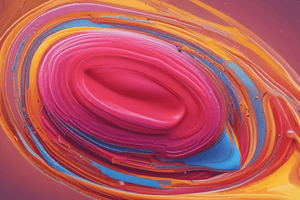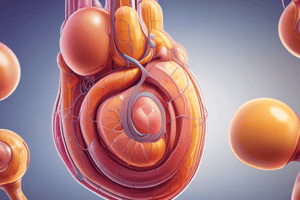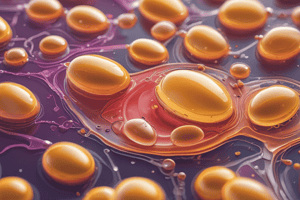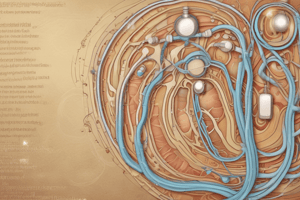Podcast
Questions and Answers
What is a potential consequence of severe dehydration on kidney function?
What is a potential consequence of severe dehydration on kidney function?
- Decrease in blood pressure
- Inability to filter waste properly (correct)
- Increased blood flow to the kidneys
- Improved waste filtration
How can high cholesterol levels affect the kidneys?
How can high cholesterol levels affect the kidneys?
- They increase urine production significantly
- They improve blood flow to the kidneys
- They enhance kidney filtration rate
- They can lead to kidney disease (correct)
What happens to the filtration rate in the kidneys due to dehydration?
What happens to the filtration rate in the kidneys due to dehydration?
- It fluctuates randomly
- It reduces (correct)
- It increases significantly
- It remains the same
What is a potential risk associated with the combination of high cholesterol and high blood pressure?
What is a potential risk associated with the combination of high cholesterol and high blood pressure?
Which condition can develop as a result of severe dehydration affecting the kidneys?
Which condition can develop as a result of severe dehydration affecting the kidneys?
What is the primary function of the kidneys?
What is the primary function of the kidneys?
How do kidneys contribute to blood pressure regulation?
How do kidneys contribute to blood pressure regulation?
What hormone is produced by the kidneys that is essential for red blood cell production?
What hormone is produced by the kidneys that is essential for red blood cell production?
Which of the following is a symptom of severe dehydration?
Which of the following is a symptom of severe dehydration?
What type of cholesterol is considered 'good' cholesterol?
What type of cholesterol is considered 'good' cholesterol?
Which lifestyle change can help manage high cholesterol levels?
Which lifestyle change can help manage high cholesterol levels?
What can cause dehydration in the body?
What can cause dehydration in the body?
What determines the severity of dehydration?
What determines the severity of dehydration?
Flashcards
Dehydration and Kidney Function
Dehydration and Kidney Function
Reduced blood volume due to dehydration lowers blood flow to the kidneys, impacting their ability to filter waste.
Dehydration and Filtration Rate
Dehydration and Filtration Rate
Low blood pressure due to dehydration makes it harder for the kidneys to filter waste, leading to complications.
Dehydration and Kidney Damage
Dehydration and Kidney Damage
Severe dehydration can cause the kidneys to stop functioning properly, potentially resulting in kidney damage.
Cholesterol and Kidney Blood Flow
Cholesterol and Kidney Blood Flow
Signup and view all the flashcards
High Cholesterol and Blood Pressure
High Cholesterol and Blood Pressure
Signup and view all the flashcards
Kidneys
Kidneys
Signup and view all the flashcards
Nephron
Nephron
Signup and view all the flashcards
Blood Filtration
Blood Filtration
Signup and view all the flashcards
Urine
Urine
Signup and view all the flashcards
Dehydration
Dehydration
Signup and view all the flashcards
Cholesterol
Cholesterol
Signup and view all the flashcards
Low-density lipoprotein (LDL)
Low-density lipoprotein (LDL)
Signup and view all the flashcards
High-density lipoprotein (HDL)
High-density lipoprotein (HDL)
Signup and view all the flashcards
Study Notes
Kidneys
- Kidneys are bean-shaped organs located on either side of the spine, behind the abdominal cavity.
- Their primary function is to filter waste products from the blood and maintain the body's fluid balance.
- They regulate blood pressure, electrolyte levels, and red blood cell production.
- Kidneys convert vitamin D to its active form, which is essential for calcium absorption.
- They produce hormones like erythropoietin (EPO), necessary for red blood cell production.
- The nephron is the functional unit of the kidney; it filters blood and produces urine.
- Kidneys filter blood, removing excess water, salts, and waste products.
- Filtered waste and excess water become urine.
- Urine passes through the ureters to the bladder, where it is stored before excretion.
Dehydration
- Dehydration occurs when the body loses more fluids than it takes in.
- This imbalance can lead to a drop in blood volume and inadequate blood pressure.
- Symptoms of mild dehydration include thirst, fatigue, dry mouth, and headache.
- Severe dehydration can result in dizziness, confusion, low blood pressure, rapid heart rate, and reduced urine output.
- Dehydration can affect various systems in the body, impacting kidney function.
- Causes of dehydration include insufficient fluid intake, excessive sweating, vomiting, diarrhea, and fever.
- The severity of dehydration is determined by the percentage of body weight lost due to fluid loss.
- Treatment for dehydration involves replacing lost fluids through oral rehydration or intravenous fluids.
Cholesterol
- Cholesterol is a waxy substance found in all parts of the body.
- It's crucial for cell function, hormone production, and vitamin D synthesis.
- There are different types of cholesterol, including low-density lipoprotein (LDL) and high-density lipoprotein (HDL).
- High LDL cholesterol is linked to a buildup of plaque in the arteries, potentially leading to cardiovascular diseases.
- HDL cholesterol is considered "good" cholesterol; it helps remove LDL from the arteries.
- Dietary sources of cholesterol include animal products like meat, poultry, and dairy.
- The liver also produces cholesterol.
- High blood cholesterol levels can increase the risk of heart attack and stroke.
- Regular blood tests are crucial to monitor cholesterol levels and determine if any intervention is necessary.
- Lifestyle changes, such as diet and exercise, can affect cholesterol levels.
- Medications can also be prescribed to manage high cholesterol levels.
Kidney Function and Dehydration
- Dehydration significantly impacts the kidneys' ability to function effectively.
- Reduced blood volume due to dehydration causes a reduced blood flow to the kidneys.
- Less blood flow reduces the filtration rate in the kidneys.
- In severe dehydration, the kidneys may not be able to filter waste properly, potentially leading to kidney damage.
- Dehydration can even lead to acute kidney injury.
Cholesterol and Kidneys
- High cholesterol levels can contribute to the buildup of plaque in blood vessels leading to the kidneys.
- This can reduce blood flow to the kidneys, impacting their filtration function.
- Kidney disease can develop due to prolonged, severe high cholesterol levels.
- High cholesterol can also lead to high blood pressure, which further stresses the kidneys.
Studying That Suits You
Use AI to generate personalized quizzes and flashcards to suit your learning preferences.




